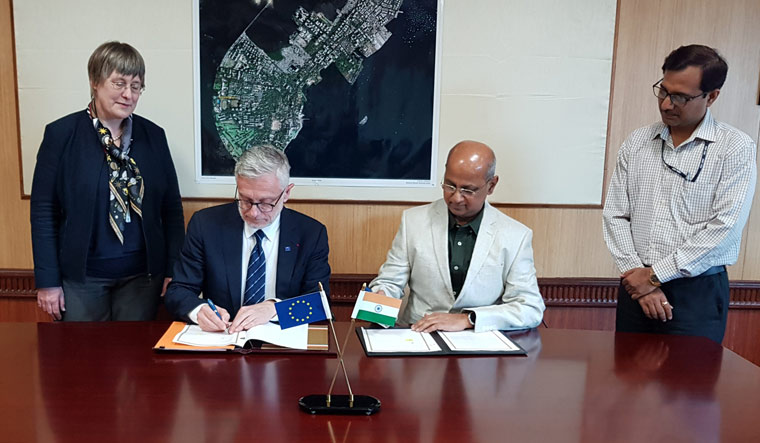The European Commission has agreed to provide India with free, full and open access to the data from its Copernicus Sentinel family of satellites. In return, India will provide the European partners of the Copernicus programme free access to the data gathered by India's earth observation satellites.
This follows an agreement signed today in Bengaluru between Philippe Brunet, who is European Commission's director for space policy, Copernicus and defence, and ISRO's scientific secretary P.G. Diwakar.
The data will be exchanged between each other's data hub. Thus, the data from India, gathered by India's Oceansat-2, Megha-Tropiques, Scatsat-1, SARAL, INSAT-3D, INSAT-3DR, will be made available for distribution on the Europe's Copernicus hub. Of course, there will not be any sharing of high-resolution commercial satellites data.
Europe's Copernicus programme, which has a full, free and open data policy, claims to have a thriving user base in Europe, and beyond. It provides a wide range of applications such as climate change, land, ocean and atmosphere monitoring as well as support in forecasting, management and mitigation of natural disasters.
The arrangement includes technical assistance for establishment of high bandwidth connections with ISRO sites, in particular through setting up of mirror servers, data storage and archival facilities. India has an ambitious and wide-ranging earth observation programme which Europe is keen to tap. By the new arrangement, India will allow European scientists access to in situ data from its regional observatory networks of geophysical and meteorological data. ISRO will coordinate access to in situ data and promote the use of information and data provided by the Copernicus programme with various institutions and government agencies, particularly the environmental sector, academia and the private sector.
The arrangement is also expected to lead to development of an active downstream sector in Europe and in India, as well as to joint product development. Both sides want to encourage cooperation on data processing for common use in line with the EU-India Agenda for Action-2020, which envisages long-term management of natural resources, monitoring of marine and coastal areas, water resource management, impacts of climate variability and climate change adaptation, disaster risk reduction, food security and rural development, infrastructure for territorial development and health management issues.
Both sides support free, full and open access for end users to data and information. There will be no exchange of funds.
Copernicus is a leading provider of earth observation data across the globe, which helps save lives at sea; improves response to natural disasters such as earthquakes, forest fires or floods; allows farmers to better manage their crops; and collects data from earth observation satellites and ground stations, airborne and sea-borne sensors. India has twice made use of its services in the recent years—first when a tropical storm hit Odisha coast in 2013, and when floods hit Andhra Pradesh in October 2014. On India's request, the European Commission's Emergency Response Coordination Centre activated the EU Copernicus Emergency mapping service for making delineation maps which indicated the extent of damage.
These services are enabled by the earth observation data obtained from the six Copernicus Sentinel satellites currently in orbit, as well as a number of contribution missions from other operators.


